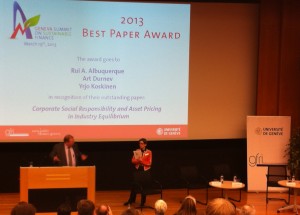Socially Responsible Investment returns in periods of crisis
March, 22 2013The know-how and how to know it
This first “Geneva Summit On Sustainable Finance” edition gathered several participants come to listen to international specialists of the sustainable finance during a day of exchanges which will have allowed to build bridges between academics and practitioners of the sector.
It is not only to select companies on criteria of durability but also to help companies less involved towards more durability. European and American professors of economy and finance debated various themes as the setting of prices for assets, the influence of the short term in the determination of prices or else the role and the behaviour of investors relative to the responsible investments.
For the majority of the participants of this morning, CSR is no more and no less a management of risks and of externalities. Actually, at a time of crisis particularly, a company with a successful CSR policy would be less subject to trials or to accidents and would be more careful on the whole with better relationships with authorities, hence this over performance in period of crisis.
The success of this first edition – called to be held annually- is one very good news for Geneva. In a context of greater international competition, we absolutely need to welcome on our ground a major international event which is at the same time a showcase of our know-how regarding sustainable finance, but also a leverage of radiance for the Swiss economy as a whole.
Switzerland is indeed an international leader regarding socially responsible finance. But who is aware of it?
- Who knows that Switzerland is the first country in the world in rate of subscription in products of socially Responsible Investment by the individuals?
- Who knows that we are the worldwide leader in microfinance?
- Who is aware that Switzerland was (and still is today) in the top of all big innovations in sustainable finance in the course of last 10 years, ie. extra-financial research, Shareholder commitment, from advisory to philanthropy, of responsible investment or else impact investing?
The answer is simple: nobody – or almost – except the specialists of the sector. I nevertheless dream of a day when, in the popular consciousness, Switzerland will be associated as much with the sustainable finance as it can be with the watch or with the chocolate industries today!
We shall not get there alone. To develop this already existing comptences as a unique know-how, it is necessary for us to invest from now on to make it known. The annual conference is a first block – essential – of this ambitious program. It will soon be completed by other actions of communication and public relations which will allow Switzerland to assert its leadership and to point out to the rest of the world that the socially responsible finance, it is here!
Conditions for performances
A strategy of socially responsible investment over performs when it aims at non-responsible companies and transforms them Let’s review two presentations among the most stunning ones : Summary Geneva Symposium The conditions of performance
 John Nosinger : Socially Responsible Funds and Market Crises
John Nosinger : Socially Responsible Funds and Market Crises
Sebastien Pouget :Asset Prices and Corporate Behavior with Socially Responsible Investors
John Nofsinger, professor at the University of Washington, gave certainly one of the most awaited presentations on the valuation of the performance of the responsible investments. His research “Socially Responsible Funds and Market Crises” showed that the performances of the responsible investments depended mainly on the stage of the market cycle. More precisely, its experiments showed that although the responsible investments under performed on average in period of growth (on average-0.67 % in comparison with the benchmark), they overperform more widely in period of crisis (on average +1,66 % in comparison with the benchmark).
This survey concerns 239 funds of investments in American shares over period 2000-2010, compared with traditional funds of the same class of assets. John Nofsinger’s conclusions on these results suggest that firms applying rules of corporate social responsibility (CSR) have a better management of environmental, social and governance (ESG) risks and therefore a better resistance in period of crisis.
Moreover, the results of this study show that ” best in class ” strategy and ESG analyses are those which bring the highest effects and increase the gap with the traditional funds. Especially, the criteria of governance seems to be the most “rewarding « in period of crisis (+2,99 % of overperformance on average).
On the other hand, strategies «of exclusion» (exclusion from some sectors as the tobacco, GMO or nuclear technology) have in itself no measurable added value in performance and do not overperform no benchmark. Finally, study also highlights that the difference in performance would come mainly from companies themselves and of their CSR commitment and not from the management of the fund managers.



